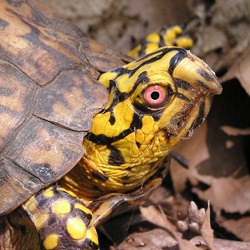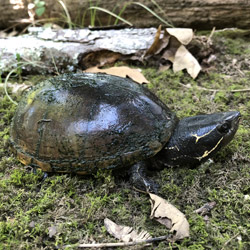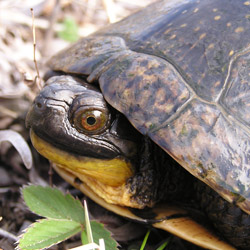Main Content
Article
Turtles as Pets
 All native species of turtles that were taken from the wild or are listed as an endangered species CANNOT be sold in Indiana.
All native species of turtles that were taken from the wild or are listed as an endangered species CANNOT be sold in Indiana.
Turtles DO NOT make good pets!
Reasons why turtles aren’t good pets:
- Turtles require time and money for proper care, and some species can live up to 50 years or more.
- Pet turtles do not like to be held and are loners; therefore, they can become boring pets for children.
- Turtles are cold-blooded and need a source of heat. They also require an ultraviolet light for proper growth and health.
- Without this special light, many health issues arise such as metabolic bone disease.
- It is very important to know what kind of species you want and the care it needs before you acquire a pet turtle. Many need special food and tanks.
- Each species has different feeding requirements, with some being strictly carnivores or herbivores. Northern map turtles, for example, have restricted diets that must include snails, aquatic insects and crayfish. Some species of aquatic turtles, such as the red-eared slider, northern map turtle, and softshells, grow up to 12 inches long, requiring a large tank for swimming and basking.
- Land turtles need a large pen, with sufficient substrate, properly sized water bowl, and a hide area, as well as heat. Some require more humidity than others.
- If you no longer want your pet turtle, you cannot release into the wild because it is not likely to survive.
- It will have to find its own food, deal with the elements and deal with predators.
- These once-captive turtles are also likely to transmit diseases to wild turtle populations.
- Turtles can carry salmonella bacteria.
- The Centers for Disease Control and Prevention recommend that children, pregnant women, and persons with compromised immune systems avoid contact with reptiles to avoid getting salmonella.
- The DNR does not encourage the keeping of turtles as pets, but does allow it if the native turtle species is obtained legally with a hunting or fishing license.
 It is illegal to sell wild turtles
It is illegal to sell wild turtles
Many native, wild-caught turtles are still sold as pets, even though this practice is illegal in Indiana. The collection of wild turtles has caused many species to become endangered, especially when combined with habitat loss, water pollution and predators. Predators such as raccoons eat a large number of turtle eggs each year, and some turtle species do not even breed until they are several years old, meaning that it can take many years for a population to become established. You can help protect Indiana’s turtles by helping to preserve turtle habitat, especially wetlands, through local conservation organizations or the Indiana Nongame Wildlife Fund.
Below is a complete listing of Indiana’s native species of turtles:
- Alligator snapping turtle (endangered)
- Blanding’s turtle (endangered)

- Eastern box turtle (special concern, protected)
- Eastern mud turtle (endangered)
- Eastern musk turtle
- False map turtle (special concern)
- Northern map turtle
- Ornate box turtle (endangered)
- Ouachita map turtle
- Red-eared slider
- River cooter (endangered)
- Smooth softshell turtle
- Snapping turtle
- Spiny softshell turtle
- Spotted turtle (endangered)
